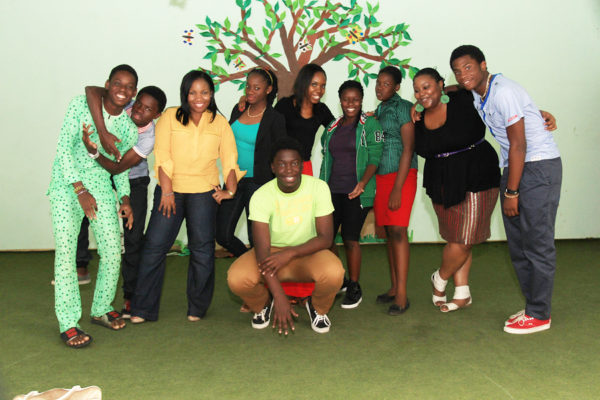News
Shaping Our Future
They say children are the future, the leaders of the next generation. So in many countries emphasis is focused on child care, education and child development. In such countries the rights and development of children take centre stage on various policy arenas and continue to gain momentum.
In Nigeria, things are a little different. Children are seen as, well, children. They are told what to do by their parents. Their schools, careers, and even marital choices are governed by their parents or other elders with very little recourse to the child’s opinion or choices. By extension, very little is paid to child development and empowerment in Nigeria. Our education system is failing and in order to counteract these deficits we export our children abroad, hoping that somehow that will make a difference.
So you can imagine my surprise when I arrived at Supreme Education Foundation School as part of the World Economic Forum Global Shapers project, which worked in collaboration with Unveiling Africa to find secondary school kids with quite strong and concrete opinions on educational needs, sporting requirements and of all things freedom of speech. The aim of the session was to mentor teenagers at the secondary school level who would be taking their GCSE examination in 2013. We hoped that the sessions would get the students motivated enough to think about their career choices and outline innovative ways to achieve them. We also wanted to get them thinking about solutions to current issues within their communities.
The sessions were split in two. The first, dealt with critical solving skills. Here the students were to come up with issues that affected them and proffered solutions, which they would then pioneer as mini projects. The second session concentrated on career building, getting the students to think about their career options and various internship opportunities.
It was during the summer holiday, so only those attending the summer school programme were available. The boys strolled in first, calm and confident. Already without saying much we could sense we had disturbed the sacred Saturday afternoon nap. The girls came next, chatty and sat easily among the boys, and after the obligatory introductions we dived straight in. The first question we asked made them laugh.
“Do you know what critical thinking is?”
It seemed an innocent enough question. But the reply we got wasn’t expected.
“We aren’t stupid, off course we know what that means.”
It turns out these kids were anything but stupid. When it came to identifying problems in their communities, their issues reflected just how dissatisfied they were with the “teacher is always right” gimmicks and how much they were actually willing to learn. Fore instance, they were worried about the level of practical education available in their science classes. They complained about both the lack of sporting equipment and the little time they were allowed to engage in sporting activity. They wanted entrepreneurial opportunities for young people their age and they were tired of not being allowed to voice their opinion on issues that affected them directly. What was most surprising for me was their ability to also reflect on how they themselves may be responsible for some of these issues. They understood, for example, that they needed to study outside what they were taught in the classroom and couldn’t blame teachers for not taking them seriously if they had on more than one occasion taken various circumstances for granted. With regards to sports, the boys complained that the girls basketball team had not shown enough interest and this led to poor results at away matches.
At the end of both sessions, we had come up with various mini projects aimed at solving some of these issues which each student would champion. The new head girl would re-enact the student parliament and ensure they had a direct link to the Parents Teachers Association. They hoped that having a direct interface with the parents would allow the teachers to take their opinions seriously. The male sports prefect planned to start a try out event for different sports and had agreed to arrange coaching sessions for the girls’ basketball team at the start of the academic year.
At the end of both sessions I couldn’t help but feel that these teenagers had also in some way mentored me. I went for this session eager to impart wisdom. I was literally prepared to talk their ears off about how they needed to be serious now and strategise for their future. Instead, I realised that they knew that they needed to work hard. They had ideas and were prepared to do the work to achieve them. All that was lacking was opportunity; opportunity to be heard, opportunities to learn and opportunities to develop.
But with dwindling infrastructure, an at best a passive government and a lack of job and skill attainment opportunities it would be difficult to imagine that they will find these opportunities on home soil. What will most likely happen is that they will migrate abroad, get educated and use their ideas, enthusiasm and energy to impact foreign economies, while Nigeria remains the same. So the brain drain will continue. We will continue to export our best abroad, frustrate those who choose to remain at home and watch our country decay inwards from stagnation.
Nothing is quite as unfortunate. Tomorrow’s ideas are hidden in the minds of these kids and we are doing nothing to harness it. Instead we have caged them with traditional and myopic thinking and the results are plain to see. Perhaps if we actually encouraged and provided our kids with more sporting opportunities Nigeria may have had a better showing at the recent London 2012 Olympics. Perhaps if we gave these kids a voice in day to day decision making process, we could create community aware politicians who are able to speak for voice of the people. Maybe if we concentrated on providing practical science lessons, instead of the current cram and regurgitate teaching method, we’d have more scientists, researchers and developers. Imagine a Nigeria bursting with both talent and opportunity. That could be the future Nigeria, if only we are ready to shape it that way.
_____________________________________________________________________________________________
Glory Edozien works as a project manager for an Environmental Firm in Lagos, she is an editor at Bella Naija and a Global Shaper. The Global Shapers community is an initiative of the World Economic Forum. Follow the Lagos Hub Global Shapers @WEFLagosHub




















